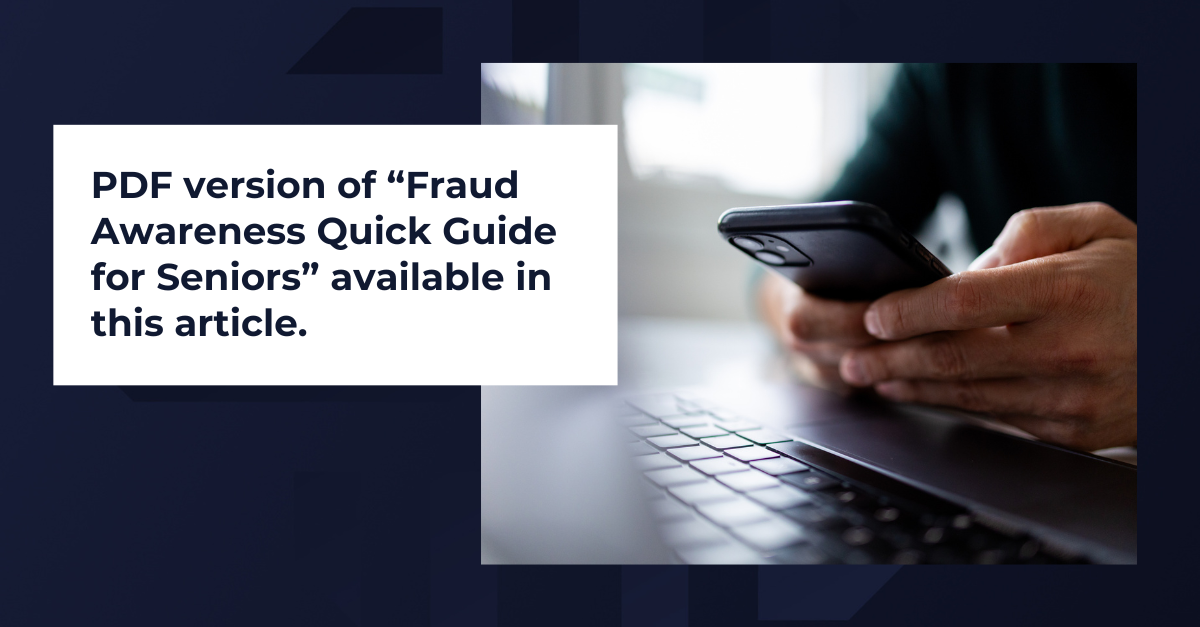From phishing schemes and investment fraud to healthcare scams and grandparent hoaxes, seniors face increasingly deceptive tactics aimed at exploiting their trust and financial resources, especially those with substantial assets.
In recognition of National Senior Fraud Awareness Day, we created a quick guide to identify common fraud and scam tactics as a means to equip clients, friends and family with the knowledge to safeguard their assets against potential exploitation. Read and share the guide below to learn more.
For an easily accessible version, print out or save the one-page guide linked here.
Investment Scams involve financial crimes positioned as low-risk investments with guaranteed returns. The criminal may pressure seniors into making quick decisions without proper research or without consulting their financial advisors. Before making any investment decisions, individuals should consult with their advisor team and be sure to fully understand the opportunity.
Business Email Compromise Scams involve criminals compromising email accounts and other forms of communication, like phone numbers and virtual meeting applications, to conduct unauthorized transfers of funds. This type of scam targets businesses or individuals working with suppliers and/or businesses regularly performing wire transfer payments. At Fidelis Capital, we are extremely sensitive to evolving, sophisticated fraud tactics. After a client notifies us to make a wire transfer, we will call the client to verify and confirm the request. Similarly, we notify clients when documents are sent via email for signature. As always, contact your Fidelis Capital advisor team with any questions about this process.
Phishing Scams are common across all age groups and involve emails, calls or texts from criminals pretending to be from reputable organizations -- like banks and government agencies -- or even family members asking for personal, financial or login credentials. As a best practice, individuals should never give out personal information online or over the phone unless they initiate the contact and/or are sure of the other person's identity. Look carefully at company logos and names, and avoid clicking any links, which could carry viruses.
Confidence and Romance Scams involve criminals creating a fake online identity to forge a romantic or close relationship as a means to manipulate and/or steal from an individual. The criminal will seem believable and caring, with the intent of quickly establish a relationship. They usually present a background that makes it difficult to meet in person, such as serving in the military or being employed in an industry requiring travel outside of the United States. No matter what story is told, individuals should avoid sending money via check, wire transfer, cash, or cryptocurrency to people they met online and have never met in person. As a reminder, never share online banking credentials, social security number or date of birth with these individuals.
- Grandparent Scams fall into this category; they involve criminals impersonating a panicked loved one who claims to be in trouble and needs money immediately, typically via wire transfer or gift cards. Similar to how Fidelis Capital verifies wire requests, individuals can call the family member in question (or their guardian) to determine if there is any validity to the situation.
Healthcare Fraud involves criminals posing as healthcare providers or insurers offering fake services or products. They may also try to obtain seniors' Medicare information for fraudulent billing purposes. As a best practice, do not share personal or medical information over the phone unless you are sure of the person’s identity and their organization affiliation. Review medical bills when received and report any suspicious charges to your healthcare provider or Medicare. Reminder, an “Explanation of Benefits” is typically not a bill.
Tech Support Scams are calls or emails to individuals claiming to be from tech support, warning of computer viruses or other issues. The criminal then asks for remote access to the individual's computer or for payment for unnecessary services. As a best practice, never give control of tech devices to a stranger unless their services were solicited through a reputable source.
Need to Report Elder Fraud?
If you or someone you know may have been a victim of elder fraud, contact your Fidelis Capital relationship team and local FBI field office (or submit a tip online at tips.fbi.gov). If the suspected fraud was internet-facilitated, you can also file a complaint with the FBI’s Internet Crime Complaint Center at ic3.gov. For more resources on senior fraud, please visit the FBI’s Elder Fraud page for additional information and videos.
Resources:
FBI: Common Scams and Crimes – Elder Fraud
